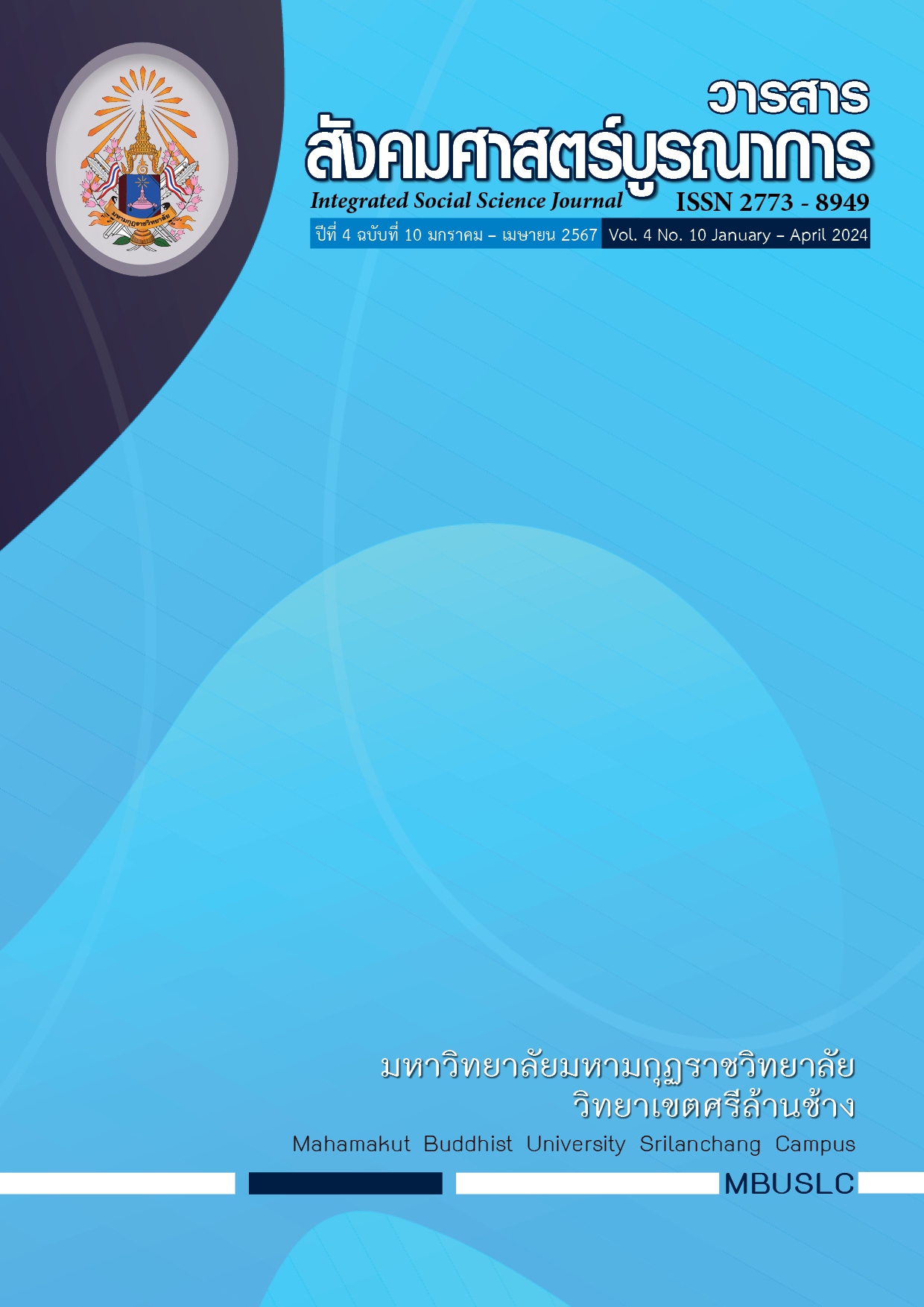GUIDELINES FOR MANAGEMENT OF ZERO WASTE SCHOOL UNDER LOEI PRIMARY EDUCATIONAL SERVICE AREA OFFICE 1
Main Article Content
Abstract
The objectives of this research were as follows: 1. to study the current conditions, desirable conditions, and priority needs of zero waste school management guidelines for schools under the Loei Primary Educational Service Area Office 1. 2. to develop waste-free school management guidelines of schools under the Loei Primary Educational Service Area Office 1. 3. to evaluate the guidelines zero waste school management of schools under the Loei Primary Educational Service Area Office 1. The research is divided into 3 phases: Phase 1: Study of the current conditions, desirable conditions, and priority needs. The sample consisted of 377 people, comprising 86 school administrators and 291 teachers, drawn by using Krejcie & Morgan's sample size criteria and stratified random sampling from the size of educational institutions. (R.V.krejcie & D.W.Morgan,1986) The questionnaire was use for data collection, it was a 5-level rating scale questionnaire with a reliability value for the entire version equal to .99. Phase 2: Development of zero waste school management guidelines was divided into two steps as follows: Step 1: entailed in-depth interviews with three educational administrators by purposive selection, using a semi-structured interview. Step 2 was on a focus group discussion among 9 qualification as stakeholders and involved in the administration of a zero waste school. Phase 3: Evaluate guidelines for managing waste-free schools. Guidelines were evaluated by 5 experts. Quantitative data were analyzed by finding frequency, percentage, mean, and standard deviation. and the modified priority needs index. Qualitative data analysis by means of content analysis The research results found that 1. Overall, the current conditions of zero waste school management were at a high level (x̅ = 3.81, S.D. = 2.31 while the desirable condition of zero waste school management were at the highest level. (x̅ = 4.89, S.D. = 0.31) And the modified priority needs index for zero waste school management were as follows : (1) operation of zero waste school activities (PNI modified = 0.2960)
(2) the application of the Sufficiency Economy Philosophy to promote environmental quality.
(3) participation process (4) Knowledge promotion and understanding of solid waste management (5) the achievement of zero waste schools , and (6) policy and operational plans. 2. The guidelines for zero waste school management consisted of six components: (1) Policy and operational plans consisted of 3 operational methods, 3 activities, and 10 methods of practice; (2) Knowledge promotion Understanding of solid waste management consisted of 3 operational methods, 5 activities, and 11 methods of practice; (3) Participation process consisted of 3 operational methods, 3 activities, and 9 methods of practice; (4) Operation of zero waste school activities consisted of 3 operational methods, 6 activities, and 9 methods of practice; (5) The application of the philosophy of Sufficiency Economy to promote environmental quality consisted of 3 operational methods, 4 activities, and 11 methods of practice; and (6) the achievement of waste-free schools. consisted of 3 operational methods, 3 activities, and 12 methods of practice. 3. The overall assessment level of the guidelines for zero waste school management guidelines by 5 experts was the highest level. (x̅ = 4.54, S.D. = 0.49) The order, from highest to lowest, is utility (x̅ = 4.68, S.D. = 0.48), followed by propriety (x̅ = 4.53, S.D. = 0.53), and feasibility (x̅ = 4.41, S.D. = 0.46).
Article Details

This work is licensed under a Creative Commons Attribution-NonCommercial-NoDerivatives 4.0 International License.
บทความที่ได้รับการพิจารณาจากคณะกรรมการผู้ทรงคุณวุฒิและเผยแผ่ในวารสารฉบับนี้ เป็นทัศนคติและข้อคิดเห็นส่วนบุคคลของผู้เขียนแต่ละท่าน ไม่ถือว่าเป็นทัศนะคติและความรับผิดชอบ
ของบรรณาธิการ
บทความ ข้อมูล เนื้อหา รูปภาพ ฯลฯ ที่ได้รับการตีพิมพ์ในวารสารสังคมศาสตร์บูรณาการ ถือเป็นลิขสิทธิ์ของวารสารสังคมศาสตร์บูรณาการ หากบุคคลหรือหน่วยงานใดต้องการนำทั้งหมดหรือส่วนหนึ่งส่วนใดไปเผยแพร่ต่อหรือเพื่อกระทำการใด ๆ จะต้องได้รับอนุญาตเป็นลายลักอักษรจากวารสารสังคมศาสตร์บูรณาการ ก่อนเท่านั้น
References
กษิรา กาเยาว์. (2550). การจัดการสิ่งแวดล้อมชุมชนของกลุ่มไตรภาคีในชุมชนกะรนจังหวัดภูเก็ต. เชียงใหม่ : วิทยานิพนธ์ ศิลปศาสตรมหาบัณฑิตสาขาวิชาการจัดการมนุษย์กับสิ่งแวดล้อม. มหาวิทยาลัยเชียงใหม่.
กรมส่งเสริมคุณภาพสิ่งแวดล้อม กระทรวงทรัพยากรธรรมชาติและสิ่งแวดล้อม. (2558). บทเรียนความสำเร็จในการบริหารจัดการโรงเรียนปลอดขยะ (Zero Waste School). กรุงเทพมหานคร: โรงพิมพ์ คุรุสภาลาดพร้าว.
กรมส่งเสริมคุณภาพสิ่งแวดล้อม. (2550). คู่มือโรงเรียนสิ่งแวดล้อมศึกษาเพื่อการพัฒนาอย่างยั่งยืน. กรุงเทพมหานคร : กรม.
กรมส่งเสริมคุณภาพสิ่งแวดล้อม. (2544). แนวทางสร้างสรรค์ Eco School โรงเรียนสิ่งแวดล้อมศึกษา เพื่อการพัฒนาที่ยั่งยืน. ค้นเมื่อ 3 ตุลาคม 2565, จากhttp://www.deqp.go.th/media/36848/ development-resize.pdf.
กรมส่งเสริมคุณภาพสิ่งแวดล้อม. (2544). สะพานสีเขียวสู่การปฏิบัติสิ่งแวดล้อมศึกษา. กรุงเทพฯ: อมรินทร์พริ้นติ้ง แอนด์ พับลิชชิ่ง.
ก่อโชค นันทสมบูรณ์. (2565). การพัฒนากิจกรรมการเรียนรู้สิ่งแวดล้อมศึกษาแบบมีส่วนร่วมเพื่อการจัดการ สิ่งแวดล้อมที่ยั่งยืนสำหรับชุมชนตำบลลำพาน อำเภอเมือง จังหวัดกาฬสินธ์. วิทยานิพนธ์ปรัชญาดุษฎีบัณฑิต สาขาวิชาสิ่งแวดล้อมศึกษา มหาวิทยาลัยมหาสารคาม.
สิทธิสมบูรณ์ เจริญพาณิชย์พันธ์.(2555). กระบวนการจัดการขยะอินทรีย์ฐานศูนย์ในชุมชนเกตุไพเราะ 3-4-5. กรุงเทพมหานคร. มหาวิทยาลัยธรรมศาสตร์.
สุทธิพงศ์ นิพัทธนานนท์. (2556). แนวทางในการพัฒนาโรงเรียนสิ่งแวดล้อมศึกษาเพื่อการพัฒนา ที่ยั่งยืนตามกรอบของกรมส่งเสริมคุณภาพสิ่งแวดล้อม. เชียงใหม่ : บัณฑิตวิทยาลัยมหาวิทยาลัยราชภัฏเชียงใหม่.
สุทธิพงศ์ นิพัทธนานนท์ และมนัส สุวรรณ์. (2557). ปัจจัยสนับสนุนการเป็นโรงเรียนสิ่งแวดล้อมศึกษาเพื่อการพัฒนาอย่างยั่งยืนในเขตภาคเหนือตอนบน. Parichart Journal 26 (2), 95-111.
สุพรรณี อัครเดชเรืองศรี. (2559). กลยุทธ์การบริหารโรงเรียนสิ่งแวดล้อมศึกษาที่มุ่งผลลัพธ์การเรียนรู้สู่การพัฒนาที่ยั่งยืน. กรุงเทพมหานคร : คณะครุศาสตร์ จุฬาลงกรณ์มหาวิทยาลัย.
สำนักงานเขตพื้นที่การศึกษาประถมศึกษาเลย เขต 1. ข้อมูลสาธารณะ สำนักงานเขตพื้นที่การศึกษา ประถมศึกษาเลย เขต 1. ค้นเมื่อ 9 ธันวาคม 2565, จาก https://loei1.go.th/

